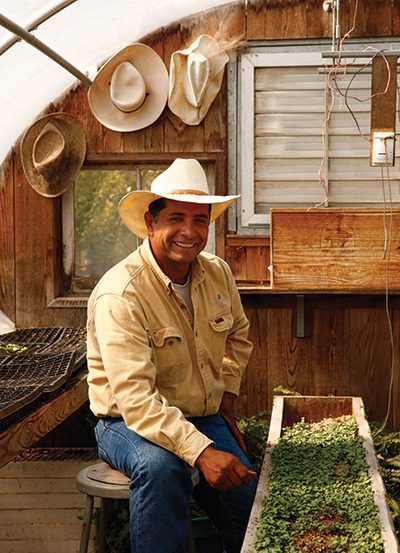
Beach Plum Farm, West Cape May
One day last summer, a slat-sided flatbed truck brimming with baskets of fresh fruit and produce rolled into Cape May. Its eclectic cargo included jalapeño and poblano peppers, heirloom Cherokee tomatoes, gold cherry tomatoes, watermelon radishes, bottle-cap squash, Japanese eggplant, red kale, collard greens, zucchini blossoms, arugula, raspberries, blackberries and herbs.
To gather such a diverse load, a truck would have to stop at many different farms—or so one might think. But everything on the truck came from one 65-acre spread—Beach Plum Farm—and everything had been harvested that day. Before the truck trundled off the property, it also stopped at the hen house to pick up 24 dozen eggs—one day’s output by the farm’s 350 Jersey Giant and Rhode Island Red chickens, prolific layers that thrive in the South Jersey climate.
As farms go, Beach Plum is small, but its output—more than 100 kinds of fruit, produce and flowers—is highly varied. Boutique size and boutique selection are part of what makes it artisanal, along with its sustainable farming methods. Think of Beach Plum and other like-minded operations not as pipsqueaks among agro-giants, but as carefully curated, lovingly tended backyard gardens expanded to impactful size.
The truck didn’t have far to go. The farm lies less than two miles from downtown Cape May, where the truck made three stops: at the Virginia Hotel & Cottages, the motel-like Beach Shack and the Congress Hall Hotel. That evening, at the Ebbitt Room in the Virginia, executive chef Anthony Micari served a smoky eggplant soup with spicy red-pepper aioli and a salad of Beach Plum greens topped with the gold cherry tomatoes and fresh herbs. Later that night, a visitor stopping for a nightcap at the Rusty Nail, the Beach Shack’s bar, could kick back with a fresh blackberry-and-mint mojito. Next morning at the Blue Pig Tavern in Congress Hall, chef Jeremy Einhorn’s deviled eggs sold out, as usual. What makes them so popular? The stunning freshness of the eggs has more than a little to do with it.
It’s no coincidence that all three properties are owned by Cape Resorts Group. In 2007, Curtis Bashaw, cofounder and co-managing partner of Cape Resorts, bought what was then fallow farmland just outside town and turned it into Beach Plum Farm. As a child, he had often helped out on his grandfather’s 10-acre spread in Cherry Hill, growing vegetables and raising turkeys. Around age 10, the demolition of a farm belonging to close family friends stuck with the young Bashaw as a warning about the fate of small local agriculture. Over the years, he watched as farms were converted to housing developments. “South Jersey’s heritage is deeply rooted in agriculture,” he says. “The loss of the meaning of ‘Garden State’ was happening in my lifetime.”
Beach Plum now provides more than 80 percent of the produce served in the Ebbitt Room in summer, says Micari. That did not happen overnight, largely owing to the nature of farming. To illustrate, Bashaw, 52, cites asparagus. “You plant the first year, and you can’t harvest at all,” he says. “The second year, you can only take a little off the top, because you want to strengthen the stem. So not until the third year can you actually harvest it. You have to be very patient. The same is true for strawberries and raspberries.”
Indeed, patience is the sine qua non of all farming, especially when the goal is an artisanal rather than a commodity product. In 2008, Beach Plum opened with one beehive tended by a local beekeeper. With help from the Rutgers Cooperative Extension in 2010, the honey making got up to speed. There are now 13 hives. In 2010, Beach Plum added pigs, switching to the better-tasting heirloom Berkshire breed in 2011. The first Berkshire meat reached Cape Resorts restaurants last fall. Chickens were added in 2011. Last year the farm took on one ram and four ewes. The first lambs are expected this spring.
For Bashaw, a graduate of the Wharton School of Business at Penn, the learning curve has been steep. “I went from being a kid in the candy store, thinking I could do everything, to pulling back to focus on specialty items that are harder and more expensive to buy,” he says.
“Each crop is its own world of information and has its own learning subset,” he adds. “It harkens back to the model of the old family farm, where you had to be sustainable to survive, so you had to know about every product.”
Another lesson he’s learned: “It truly is life and death on the farm. It’s always too wet or too dry, too hot or too cold. All you can do is pray. Still, it’s been rewarding.”
The public can shop at the farm on weekends or find Beach Plum goods at the West Cape May Farmers’ Market. Anyone can rent bikes at Congress Hall and pick up a free map showing the route to the farm, where they can take a free self-guided tour. 140 Stevens St, Cape May
